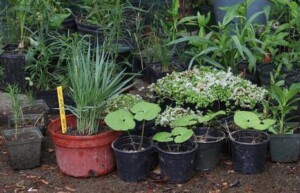“If you have a garden, you have a nursery” a friend of mine once said, and he was right. Anyone whose garden regularly produces an overabundance of celandine poppies, beardtongues, wild petunia, coneflowers, black-eyed susans, grey goldenrod, or aromatic aster will agree. The grasses may be even more enthusiastic self seeders, for in an intentionally established meadow or prairie they tend to outcompete the flowers. Shrubs and trees, too, sprout from seed, sometimes in large numbers. I have passed along many St. John’s worts and eastern red cedars, and I could have given away a staggering number of oaks and maples, if I had the time and energy to dig up their long roots.

Many plants spread by underground rhizomes or above ground runners, either fast or at moderate speed. Who has not planted a well-proportioned clump of short-toothed mountain mint and delighted in the pollinators buzzing around its tiny flowers only to discover two years later that this spreader seems determined to take over the garden. My original arrowwood viburnum has sent up side shoots that grace other Lexington gardens now, and the same is true for my bladdernut, sweetshrub and Itea. Pawpaws and sassafras growing in gardens constantly beg to have their far-running suckers dug up, potted and given away.
So why have such aggressively spreading plants not taken over the world or at least their particular niche in it? The answer, of course, is competition. In its natural habitat a plant lives among dozens if not hundreds of other plants, all crowding in on its space. The wild ginger which has just emerged along hiking paths of the Bluegrass woods is embedded among its competitors: mosses, spring and fall-blooming wildflowers, ferns about to send up their fronds, emerging trees and shrubs. It never outgrows its space because that space is limited by all the other plants that want to grow there.
A garden, by contrast, is a piece of ground where nature has been disturbed, and weeding maintains that disturbance. Gardeners, by definition, will not tolerate their cherished plants to be hemmed in by clovers, dandelions, chickweed, crabgrass or other garden plants. Wild ginger makes a great garden plant. It can be a native substitute for hostas. Its neatly rounded leaves slowly expand from the center forming a deciduous ground cover in shaded areas. And like so many other native plants, it lends itself to being moved around. When a patch of ginger seems too large, their shallow but thick roots can easily be dug, potted up and shared. A garden is a nursery indeed!
Beate Popkin
